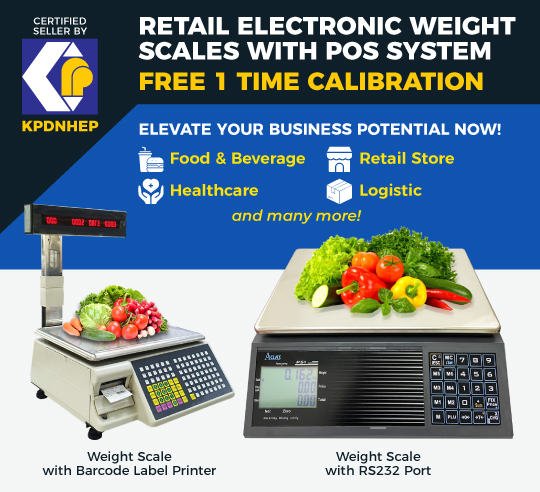Weight Scale Calibration
Weight scales are widely used in Malaysia for both personal and professional purposes. Healthcare facilities, logistics, and food service establishments are just a few examples of places where weight scales are commonly used.
When looking to purchase a weight scale in Malaysia, it is crucial to consider factors such as accuracy, reliability, and durability. Regulatory bodies like Standards Malaysia and the National Metrology Institute of Malaysia (NMIM) provide certifications for weight scales to ensure they meet specific standards for accuracy and reliability.
Weight scale calibration involves testing the weight scale at different weight levels and environmental conditions to verify its accuracy and precision. The calibration service provider will make any necessary adjustments to ensure the weight scale is providing accurate and reliable measurements.
To maintain accuracy, it is recommended to have weight scales calibrated regularly based on usage frequency and industry requirements. In conclusion, weight scale calibration is crucial to ensure accurate and reliable measurements. Choosing a certified service provider in Malaysia can help ensure your weight scale is providing accurate and reliable results.

Importance of Weight Scale Calibration
Calibrating a weight scale is crucial due to various reasons:
Accuracy
Calibrated weight scales provide accurate measurements, essential for various for various applications like recipe ingredients, hospital dosages, or retail store goods.
Compliance
Industries like healthcare, food service, and manufacturing must regularly calibrate weight scales to comply with regulations and avoid penalties and legal issues.
Consistency
Calibration ensures weight scales provide consistent and repeatable results, important for quality control and ensuring consistent product or service weights.
Safety
Inaccurate weight measurements for heavy equipment or materials can create safety hazards. Calibration helps ensure accuracy and minimize safety risks in such applications.
Calibration with KPDNHEP
Our weight scales undergo calibration and verification through Metrology Corporation Malaysia Sdn. Bhd. (MCM) to ensure their accuracy and reliability.
As per the Weights and Measures Act 1972 in Malaysia, all weighing and measuring instruments used for trade must be verified before use and re-verified once every twelve months thereafter. Metrology Corporation Malaysia Sdn. Bhd. (MCM) was established to provide verification and re-verification services for all weighing and measuring instruments used for trade in Malaysia.
At our company, we understand the importance of accuracy and precision when it comes to weight measurements. Therefore, we ensure that all of our weight scales undergo calibration and verification procedures with MCM. This ensures that our weight scales comply with regulatory standards and provide accurate and consistent weight measurements.
By using weight scales that have undergone calibration and verification procedures with MCM, our customers can have peace of mind knowing that they are using reliable and accurate equipment for their applications. We prioritize our customers’ satisfaction and believe that providing high-quality, calibrated weight scales is essential for achieving that goal.
We offer a range of weight scales suitable for various industries and applications, such as healthcare, laboratories, and retail. By choosing our calibrated weight scale products, you can have confidence in the accuracy and reliability of your weight measurements.
Weight Scale Wide Range of
Applications
A weight scale finds applications in a diverse range of industries and settings, including:
Food Service
Measure ingredients in recipes, portion sizes for meals, and the weight of food products being sold.
Healthcare
Monitoring a patient's nutritional status, calculating medication dosages, and determining appropriate treatment plans.
Retail
Weigh produce like fruits and vegetables, ensuring that customers are charged the correct price and receive the proper amount.
Logistics
Weigh packages and parcels to determine shipping costs and ensure they meet weight restrictions.
Laboratories
Measure weight of chemicals, samples, equipment, and substances for research and experimentation.
